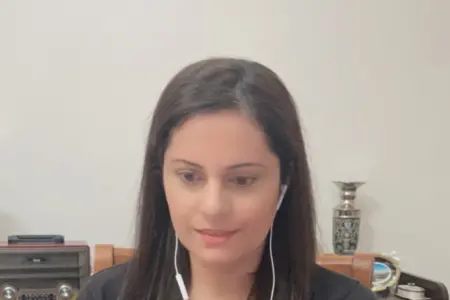PHOTO
Abu Dhabi, United Arab Emirates: Abu Dhabi University (ADU) participated in the 7th Annual International ArabWIC Conference which was held virtually by Sharjah University on 25 August 2021. The conference, which seeks to highlight the contributions of Arab women in computing and technology, saw six teams of undergraduate and postgraduate students from the Computer Science and Information Technology Department and the Electrical, Computer, and Biomedical Engineering Department at ADU’s college of Engineering showcase their advanced Artificial Intelligence (AI) and distributed systems projects and research efforts.
Participating teams from ADU, supervised by Professor Mourad Elhadef, Professor of Computer Science and Chair of Computer Science and IT Department at ADU, and Dr. Heba Ismail, Assistant Professor of Computer Science at ADU, showcased four research papers at the conference. The projects included ‘Jusoor: A Wearable Communication Device for the Deaf-Blind’ developed by Fatima Abdelmagid, Hamda Fasla and Huda Khafaji, ‘UAE e-Learning Sentiment Analysis Framework’ developed by Dana Wehbe, Hajer AlMaskari, Kholoud AlSeriedi and Ahmed AlHammadi, ‘Covisstance Chatbot’ developed by Farah Shaik and Arooba Khalid and ‘A Server-less Academic Advisor Chatbot’ developed by Rawan Elabyad, Nada Hussein and Salma Abdelhalim.
Each project addresses critical real-life problems through the use and implementation of advanced AI models and cutting-edge technologies such as serverless computing.
Jusoor is an AI-powered system assisting the deaf and blind in having natural communication with peers through instantaneous conversations. The UAE e-Learning Sentiment Analysis Framework provides real-time insights into the public’s emotions and opinions concerning the e-learning process in the UAE through sentiment analysis of social media content to help empower decision-makers and education regulators. The Covisstance Chatbot is an advanced serverless chatbot system designed with natural language understanding capabilities to help patients locate hospitals with available beds and resources. Finally, the serverless academic advisor chatbot aims to alleviate the burden imposed on academic advisors post COVID-19 by allowing college students to virtually inquire about academic matters through a Microsoft Teams-powered virtual assistant.
Master of Science in Electrical and Computer Engineering student Maha Yaghi also presented her research paper titled “Motion Tracked 3D Visualization System for Segmented ROI in Medical Imaging” during the conference. Her research, which was supervised by Prof. Mohammed Ghazal, Professor and Chair of Electrical, Computer, and Biomedical Engineering Department, and Dr. Huma Zia, Assistant Professor of Computer Engineering, proposes an analysis system for visualizing the output of 3D segmented abnormalities within associated computer diagnoses. Meanwhile, Master of Science in Electrical and Computer Engineering student Tasnim Basmaji presented her research paper titled “Towards Urgent and Rapid Deployment of Contactless IoT Elevator Control Panel during Pandemics”. Her study, supervised by Prof. Mohammed Ghazal, Dr. Anas Altarabsheh, Associate Professor of Electrical Engineering and Dr. Huma Zia, proposes a contactless elevator control system to decrease the risk of coronavirus transmission whilst using an elevator.
Dr. Hamdi Sheibani, the Dean of the College of Engineering, commented on the participation, “As a university that inspires creativity and encourages innovation, our students have produced ‘out-of-the-box’ solutions while employing advanced technologies. In the College of Engineering, we aim to foster a community of learners who are devoted to solving some of the most complex engineering challenges. During our participation at the International ArabWIC Conference, I have observed our students’ exceptional work and dedication to learn, grow and thrive in a world of technology. I am proud to say that our students were involved with such passion and enthusiasm and have developed some of the most innovative and pioneering projects the College of Engineering has ever witnessed.”
The Chair of the Conference, Dr. Manar Abu Talib, Associate Professor of Computer Science at the University of Sharjah, the host of the conference, said: "We are excited to see the level of sophistication and quality of the research papers this year. Conferences such as ArabWIC pave the way to inspire a new generation of women leaders in computing."
ArabWIC is a non-profit organization that aims to support, inspire and amplify the efforts of Arab women in computing. The ArabWIC conference is a key platform for the organization, aiming to energize the community, help facilitate connections and engage participants with international research on computing and technology.
For more information about ADU, please visit https://www.adu.ac.ae/home
© Press Release 2021
Disclaimer: The contents of this press release was provided from an external third party provider. This website is not responsible for, and does not control, such external content. This content is provided on an “as is” and “as available” basis and has not been edited in any way. Neither this website nor our affiliates guarantee the accuracy of or endorse the views or opinions expressed in this press release.
The press release is provided for informational purposes only. The content does not provide tax, legal or investment advice or opinion regarding the suitability, value or profitability of any particular security, portfolio or investment strategy. Neither this website nor our affiliates shall be liable for any errors or inaccuracies in the content, or for any actions taken by you in reliance thereon. You expressly agree that your use of the information within this article is at your sole risk.
To the fullest extent permitted by applicable law, this website, its parent company, its subsidiaries, its affiliates and the respective shareholders, directors, officers, employees, agents, advertisers, content providers and licensors will not be liable (jointly or severally) to you for any direct, indirect, consequential, special, incidental, punitive or exemplary damages, including without limitation, lost profits, lost savings and lost revenues, whether in negligence, tort, contract or any other theory of liability, even if the parties have been advised of the possibility or could have foreseen any such damages.




















